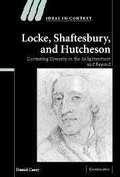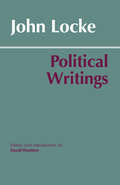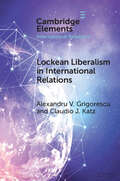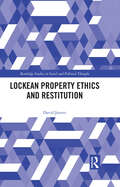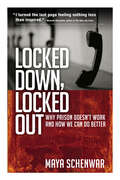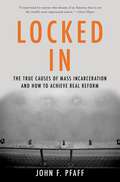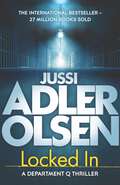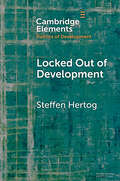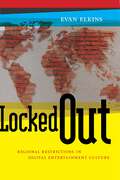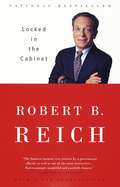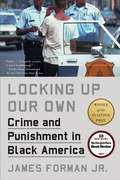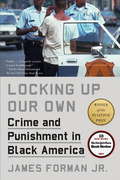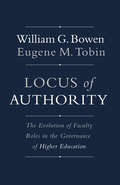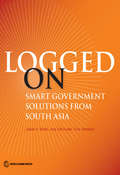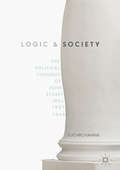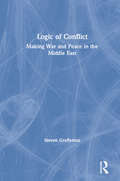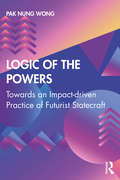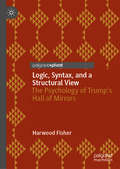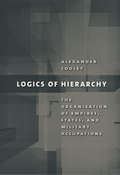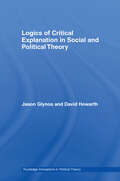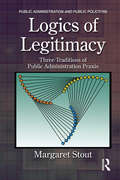- Table View
- List View
Locke, Science, and Politics
by Steven FordeIn this groundbreaking book, Steven Forde argues that John Locke's devotion to modern science deeply shaped his moral and political philosophy. Beginning with an account of the classical approach to natural and moral philosophy, and of the medieval scholasticism that took these forward into early modernity, Forde explores why the modern scientific project of Francis Bacon, Pierre Gassendi, Robert Boyle and others required the rejection of the classical approach. Locke fully subscribed to this rejection, and took it upon himself to provide a foundation for a compatible morality and politics. Forde shows that Locke's theory of moral 'mixed modes' owes much to Pufendorf, and is tailored to accommodate science. The theory requires a divine legislator, which in turn makes natural law the foundation of morality, rather than individual natural right. Forde shows the ways that Locke's approach modified his individualism, and colored his philosophy of property, politics and education.
Locke, Shaftesbury, and Hutcheson: Contesting Diversity in the Enlightenment and Beyond
by Daniel CareyAre human beings linked by a common nature, or are they fragmented by different cultural practices and values? These fundamental moral questions were debated in the Enlightenment by Locke, Shaftesbury, and Hutcheson. Daniel Carey explores the relationship between these founding arguments and contemporary disputes over cultural diversity and multiculturalism.
Locke: Political Writings
by John Locke David WoottonJohn Locke's Second Treatise of Government (c. 1681) is perhaps the key founding liberal text. A Letter Concerning Toleration, written in 1685 (a year when a Catholic monarch came to the throne of England and Louis XVI unleashed a reign of terror against Protestants in France), is a classic defense of religious freedom. Yet many of Locke's other writings--not least the Constitutions of Carolina, which he helped draft--are almost defiantly anti-liberal in outlook.This comprehensive collection brings together the main published works (excluding polemical attacks on other people's views) with the most important surviving evidence from among Locke's papers relating to his political philosophy. David Wootton's wide-ranging and scholarly Introduction sets the writings in the context of their time, examines Locke's developing ideas and unorthodox Christianity, and analyzes his main arguments. The result is the first fully rounded picture of Locke's political thought in his own words.
Lockean Liberalism in International Relations (Elements in International Relations)
by Alexandru V. Grigorescu Claudio J. KatzThis Element applies a new version of liberalism to international relations (IR), one that derives from the political theory of John Locke. It begins with a survey of liberal IR theories, showing that the main variants of this approach have all glossed over classical liberalism's core concern: fear of the state's concentrated power and the imperative of establishing institutions to restrain its inevitable abuse. The authors tease out from Locke's work its 'realist' elements: his emphasis on politics, power, and restraints on power (the 'Lockean tripod'). They then show how this Lockean approach (1) complements existing liberal approaches and answers some of the existing critiques directed toward them, (2) offers a broader analytical framework for several very different strands of IR literature, and (3) has broad theoretical and practical implications for international relations.
Lockean Property Ethics and Restitution (Routledge Studies in Social and Political Thought)
by David JarrettIn this book, David Jarrett argues that the influential Lockean thesis of justice in property, which traces back to John Locke, seems to entail much egalitarian property redistribution. Put briefly, Lockeans argue that people justly own: (1) any unowned natural resources they labour on, (2) any resources they receive via voluntary transfer from a legitimate owner, and (3) any resources they legitimately receive in compensation for harm done to their person or legitimately held property. However, a question that has been largely overlooked by Lockeans is how to address the problem of property which did not arise in line with Lockean justice. What do we do about property which derives from feudal and colonial conquest, for example? Drawing on a range of theoretical and historical sources, this book argues that the legal concept of restitution is the most reasonable way to address the problem. If we apply this concept, it appears that much property in the world is held unjustly and should be redistributed in an egalitarian manner. Lockean Property Ethics and Restitution will be of interest to political theorists and philosophers alike.
Locked Down, Locked Out: Why Prison Doesn't Work and How We Can Do Better
by Maya SchenwarThrough the stories of prisoners and their families, including her own family's experiences, Maya Schenwar shows how the institution that locks up 2.3 million Americans and decimates poor communities of color is shredding the ties that, if nurtured, could foster real collective safety. As she vividly depicts here, incarceration takes away the very things that might enable people to build better lives. But looking toward a future beyond imprisonment, Schenwar profiles community-based initiatives that successfully deal with problems—both individual harm and larger social wrongs—through connection rather than isolation, moving toward a safer, freer future for all of us.
Locked In: The True Causes Of Mass Incarceration-and How To Achieve Real Reform
by John Pfaff"A succinct, powerful explanation of why much of what we think about the incarceration boom is probably wrong." --Bloomberg ViewA groundbreaking examination of our system of imprisonment, revealing the true causes of mass incarceration as well as the best path to reformIn the 1970s, the United States had an incarceration rate comparable to those of other liberal democracies-and that rate had held steady for over 100 years. Yet today, though the US is home to only about 5 percent of the world's population, we hold nearly one quarter of its prisoners. Mass incarceration is now widely considered one of the biggest social and political crises of our age. How did we get to this point? Locked In is a revelatory investigation into the root causes of mass incarceration by one of the most exciting scholars in the country. Having spent fifteen years studying the data on imprisonment, John Pfaff takes apart the reigning consensus created by Michelle Alexander and other reformers, revealing that the most widely accepted explanations-the failed War on Drugs, draconian sentencing laws, an increasing reliance on private prisons-tell us much less than we think. Pfaff urges us to look at other factors instead, including a major shift in prosecutor behavior that occurred in the mid-1990s, when prosecutors began bringing felony charges against arrestees about twice as often as they had before. He describes a fractured criminal justice system, in which counties don't pay for the people they send to state prisons, and in which white suburbs set law and order agendas for more-heavily minority cities. And he shows that if we hope to significantly reduce prison populations, we have no choice but to think differently about how to deal with people convicted of violent crimes-and why some people are violent in the first place. An authoritative, clear-eyed account of a national catastrophe, Locked In transforms our understanding of what ails the American system of punishment and ultimately forces us to reconsider how we can build a more equitable and humane society.
Locked In: the heart-pounding final instalment of the internationally bestselling Department Q series (Department Q)
by Jussi Adler-OlsenTHE INTERNATIONAL BESTSELLER - 27 MILLION COPIES SOLD WORLDWIDEOn the day after Christmas, head of Department Q Detective Carl Mørck finds himself handcuffed in a police car headed for Copenhagen's Vestre prison. After 15 years, a violent case from his past has caught up with him. Charges of drug trafficking and murder threaten to destroy his life and career. But he is being framed. Someone has a million dollar bounty on his head to make sure he doesn't talk, putting him in grave danger among the prison's incarcerated criminals and corrupt officers. The question that remains is, why? Carl's colleagues at the Copenhagen Police Department instantly turn their backs on him, leaving the ever-loyal Department Q team as his only hope. In search of answers, Rose, Assad, and Gordon must disobey direct orders from way up the chain to try to unravel the case. With only each other to trust and Carl's battle against the unknown mastermind's henchmen worsening by the day, they must work faster than ever before if they are to clear his name - and save his life.Readers love the Department Q series⭐⭐⭐⭐⭐ 'So engrossing'⭐⭐⭐⭐⭐ 'The best author around' ⭐⭐⭐⭐⭐ 'Left me wanting more' ⭐⭐⭐⭐⭐ 'Another gripping read from Jussi Adler-Olsen!'Praise for Jussi Adler-Olsen's Department Q series:'Everything you could possibly want from a thriller and much, much more' Kirkus'Adler-Olsen is the new "it" boy of Nordic Noir' The Times'Engrossing' Sunday Express'Gripping storytelling' Guardian'As impressive as it is unnerving' Independent
Locked In: the heart-pounding final instalment of the internationally bestselling Department Q series (Department Q)
by Jussi Adler-OlsenTHE INTERNATIONAL BESTSELLER - 27 MILLION COPIES SOLD WORLDWIDEOn the day after Christmas, head of Department Q Detective Carl Mørck finds himself handcuffed in a police car headed for Copenhagen's Vestre prison. After 15 years, a violent case from his past has caught up with him. Charges of drug trafficking and murder threaten to destroy his life and career. But he is being framed. Someone has a million dollar bounty on his head to make sure he doesn't talk, putting him in grave danger among the prison's incarcerated criminals and corrupt officers. The question that remains is, why? Carl's colleagues at the Copenhagen Police Department instantly turn their backs on him, leaving the ever-loyal Department Q team as his only hope. In search of answers, Rose, Assad, and Gordon must disobey direct orders from way up the chain to try to unravel the case. With only each other to trust and Carl's battle against the unknown mastermind's henchmen worsening by the day, they must work faster than ever before if they are to clear his name - and save his life.Readers love the Department Q series⭐⭐⭐⭐⭐ 'So engrossing'⭐⭐⭐⭐⭐ 'The best author around' ⭐⭐⭐⭐⭐ 'Left me wanting more' ⭐⭐⭐⭐⭐ 'Another gripping read from Jussi Adler-Olsen!'Praise for Jussi Adler-Olsen's Department Q series:'Everything you could possibly want from a thriller and much, much more' Kirkus'Adler-Olsen is the new "it" boy of Nordic Noir' The Times'Engrossing' Sunday Express'Gripping storytelling' Guardian'As impressive as it is unnerving' Independent
Locked Out of Development: Insiders and Outsiders in Arab Capitalism (Elements in the Politics of Development)
by Steffen HertogThis Element argues that the low dynamism of low- to mid-income Arab economies is explained with a set of inter-connected factors constituting a 'segmented market economy'. These include an over-committed and interventionist state with limited fiscal and institutional resources; deep insider-outsider divides among firms and workers that result from and reinforce wide-ranging state intervention; and an equilibrium of low skills and low productivity that results from and reinforces insider-outsider divides. These mutually reinforcing features undermine encompassing cooperation between state, business and labor. While some of these features are generic to developing countries, others are regionally specific, including the relative importance and historical ambition of the state in the economy and, closely related, the relative size and rigidity of the insider coalitions created through government intervention. Insiders and outsiders exist everywhere, but the divisions are particularly stark, immovable and consequential in the Arab world.
Locked Out: Regional Restrictions in Digital Entertainment Culture (Critical Cultural Communication #14)
by Evan ElkinsA rare insight into how industry practices like regional restrictions have shaped global media culture in the digital era “This content is not available in your country.” At some point, most media consumers around the world have run into a message like this. Whether trying to watch a DVD purchased during a vacation abroad, play an imported Japanese video game, or listen to a Spotify library while traveling, we are constantly reminded of geography’s imprint on digital culture. We are locked out. Despite utopian hopes of a borderless digital society, DVDs, video games, and streaming platforms include digital rights management mechanisms that block media access within certain territories. These technologies of “regional lockout” are meant first and foremost to keep the entertainment industries’ global markets distinct. But they also frustrate consumers and place territories on a hierarchy of global media access. Drawing on extensive research of media-industry strategies, consumer and retailer practices, and media regulation, Locked Out explores regional lockout’s consequences for media around the globe. Power and capital are at play when it comes to who can consume what content and who can be a cultural influence. Looking across digital technologies, industries, and national contexts, Locked Out argues that the practice of regional lockout has shaped and reinforced global hierarchies of geography and culture.
Locked in the Cabinet
by Robert B. ReichLocked in the Cabinet is a close-up view of the way things work, and often don't work, at the highest levels of government--and a uniquely personal account by the man whose ideas inspired and animated much of the Clinton campaign of 1992 and who became the cabinet officer in charge of helping ordinary Americans get better jobs. Robert B. Reich, writer, teacher, social critic--and a friend of the Clintons since they were all in their twenties--came to be known as the "conscience of the Clinton administration and one of the most successful Labor Secretaries in history. Here is his sometimes hilarious, sometimes poignant chronicle of trying to put ideas and ideals into practice. With wit, passion, and dead-aim honesty, Reich writes of those in Washington who possess hard heads and soft hearts, and those with exactly the opposite attributes. He introduces us to the career bureaucrats who make Washington run and the politicians who, on occasion, make it stop; to business tycoons and labor leaders who clash by day and party together by night; to a president who wants to change America and his opponents (on both the left and the right) who want to keep it as it is or return it to where it used to be. Reich guides us to the pinnacles of power and pretension, as bills are passed or stalled, reputations built or destroyed, secrets leaked, numbers fudged, egos bruised, news stories spun, hypocrisies exposed, and good intentions occasionally derailed. And to the places across America where those who are the objects of this drama are simply trying to get by--assembly lines, sweatshops, union halls, the main streets of small towns and the tough streets of central cities. Locked in the Cabinetis an intimate odyssey involving a memorable cast--a friend who is elected President of the United States, only to discover the limits of power; Alan Greenspan, who is the most powerful man in America; and Newt Gingrich, who tries to be. Plus a host of others: White House staffers and cabinet members who can't find "the loop ; political consultant Dick Morris, who becomes "the loop ; baseball players and owners who can't agree on how to divide up $2 billion a year; a union leader who accuses Reich of not knowing what a screwdriver looks like; a heretofore invisible civil servant deep in the Labor Department whose brainchild becomes the law of the land; and a wondrous collection of senators, foreign ministers, cabinet officers, and television celebrities. And it is also an odyssey for Reich's wife and two young sons, who learn to tolerate their own cabinet member but not to abide Washington. Here is Reich--determined to work for a more just society, laboring in a capital obsessed with exorcising the deficit and keeping Wall Street happy--learning that Washington is not only altogether different from the world of ordinary citizens but ultimately, and more importantly, exactly like it: a world in which Murphy's Law reigns alongside the powerful and the privileged, but where hope amazingly persists. There are triumphs here to fill a lifetime, and frustrations to fill two more. Never has this world been revealed with such richness of evidence, humor, and warmhearted candor.
Locking Up Our Own: Crime And Punishment In Black America
by James FormanFormer public defender James Forman, Jr. is a leading critic of mass incarceration and its disproportionate impact on people of color. In Locking Up Our Own, he seeks to understand the war on crime that began in the 1970s and why it was supported by many African American leaders in the nation’s urban centers. <p><p> Forman shows us that the first substantial cohort of black mayors, judges, and police chiefs took office amid a surge in crime and drug addiction. Many prominent black officials, including Washington, D.C. mayor Marion Barry and federal prosecutor Eric Holder, feared that the gains of the civil rights movement were being undermined by lawlessness—and thus embraced tough-on-crime measures, including longer sentences and aggressive police tactics. In the face of skyrocketing murder rates and the proliferation of open-air drug markets, they believed they had no choice. But the policies they adopted would have devastating consequences for residents of poor black neighborhoods. <p><p> A former D.C. public defender, Forman tells riveting stories of politicians, community activists, police officers, defendants, and crime victims. He writes with compassion about individuals trapped in terrible dilemmas—from the men and women he represented in court to officials struggling to respond to a public safety emergency. Locking Up Our Own enriches our understanding of why our society became so punitive and offers important lessons to anyone concerned about the future of race and the criminal justice system in this country.
Locking Up Our Own: Crime And Punishment In Black America
by James Forman Jr.Winner of the 2018 Pulitzer Prize for General Non-FictionLonglisted for the National Book AwardOne of the New York Times Book Review's 10 Best Books of 2017Former public defender James Forman, Jr. is a leading critic of mass incarceration and its disproportionate impact on people of colour. In Locking Up Our Own, he seeks to understand the war on crime that began in the 1970s and why it was supported by many African American leaders in the nation's urban centres.Forman shows us that the first substantial cohort of black mayors, judges and police chiefs took office amid a surge in crime and drug addiction. Many prominent black officials, including Washington, DC mayor Marion Barry and federal prosecutor Eric Holder, feared that the gains of the civil rights movement were being undermined by lawlessness - and thus embraced tough-on-crime measures, including longer sentences and aggressive police tactics. In the face of skyrocketing murder rates and the proliferation of open-air drug markets, they believed they had no choice. But the policies they adopted would have devastating consequences for residents of poor black neighbourhoods.A former public defender, Forman tells riveting stories of politicians, community activists, police officers, defendants and crime victims. He writes with compassion about individuals trapped in terrible dilemmas - from the men and women he represented in court to officials struggling to respond to a public safety emergency. Locking Up Our Own enriches our understanding of why American society became so punitive and offers important lessons to anyone concerned about the future of race and the criminal justice system.
Locking Up Our Own: Winner of the Pulitzer Prize
by James Forman, Jr.Winner of the 2018 Pulitzer Prize for General Non-FictionLonglisted for the National Book AwardOne of the New York Times Book Review's 10 Best Books of 2017Former public defender James Forman, Jr. is a leading critic of mass incarceration and its disproportionate impact on people of colour. In Locking Up Our Own, he seeks to understand the war on crime that began in the 1970s and why it was supported by many African American leaders in the nation's urban centres.Forman shows us that the first substantial cohort of black mayors, judges and police chiefs took office amid a surge in crime and drug addiction. Many prominent black officials, including Washington, DC mayor Marion Barry and federal prosecutor Eric Holder, feared that the gains of the civil rights movement were being undermined by lawlessness - and thus embraced tough-on-crime measures, including longer sentences and aggressive police tactics. In the face of skyrocketing murder rates and the proliferation of open-air drug markets, they believed they had no choice. But the policies they adopted would have devastating consequences for residents of poor black neighbourhoods.A former public defender, Forman tells riveting stories of politicians, community activists, police officers, defendants and crime victims. He writes with compassion about individuals trapped in terrible dilemmas - from the men and women he represented in court to officials struggling to respond to a public safety emergency. Locking Up Our Own enriches our understanding of why American society became so punitive and offers important lessons to anyone concerned about the future of race and the criminal justice system.
Locus of Authority
by William G. Bowen Eugene M. TobinLocus of Authority argues that every issue facing today's colleges and universities, from stagnant degree completion rates to worrisome cost increases, is exacerbated by a century-old system of governance that desperately requires change. While prior studies have focused on boards of trustees and presidents, few have looked at the place of faculty within the governance system. Specifically addressing faculty roles in this structure, William G. Bowen and Eugene M. Tobin ask: do higher education institutions have what it takes to reform effectively from within? Bowen and Tobin use case studies of four very different institutions--the University of California, Princeton University, Macalester College, and the City University of New York--to demonstrate that college and university governance has capably adjusted to the necessities of the moment and that governance norms and policies should be assessed in the context of historical events. The authors examine how faculty roles have evolved since colonial days to drive change but also to stand in the way of it. Bowen and Tobin make the case that successful reform depends on the artful consideration of technological, financial, and cultural developments, such as the explosion in online learning. Stressing that they do not want to diminish faculty roles but to facilitate their most useful contributions, Bowen and Tobin explore whether departments remain the best ways through which to organize decision making and if the concepts of academic freedom and shared governance need to be sharpened and redefined. Locus of Authority shows that the consequences of not addressing college and university governance are more than the nation can afford.
Log Cabins and Outbuildings: A Guide to Building Homes, Barns, Greenhouses, and More
by The United States Department of AgricultureHomesteading is a lifestyle that people around the world gravitate toward—and for good reason. In today&’s high-stress world, many people dream of heading off to their own cabin in the woods or to their large rural oasis to escape the anxieties and complexities of daily life, to live in a more natural state. Others have embraced the agricultural lifestyle of farming as a career, serving as fundamental contributors to sustaining society. With this classic guide from the US Department of Agriculture (USDA), learn about the architecture of rural life and the design elements of these amazing structures. This manual, originally published and distributed in 1972, includes government-issued designs and requirements for log cabins, farmhouses, firepits and barbecues, greenhouses, storage sheds, stables, and more! Black-and-white diagrams and illustrations fill these pages, displaying the intricacies and dimensions of these incredible structures in their entirety. Brimming with ideas and inspiration, Log Cabins and Outbuildings is the perfect starting point for building your new rural retreat.
Logged On
by Jody Zall Kusek Zubair K. Bhatti Tony VerheijenLogged On looks at mobile and smart phone technology through the lens of good government management. How will developing governments deliver goods and services that citizens care about? How will government in these countries leapfrog over traditional public management reforms to help reach out to and collaborate directly with the citizen? This book provides example after example where this has happened and how mobile technology has helped provide solutions to old problems. Our astounding revelation that mobile technology is helping to fight corruption in Pakistan, improve health delivery in Bangladesh, provide access to government by the ordinary citizen in India, and help monitor elections in Afghanistan. If this Is possible in some place in poor South Asian countries considered the most poor in the world, then how can these examples be spread to further in these counties or in other countries? Logged on Government provides a look back on conventional solutions that have mostly not worked and why mobile solutions are taking hold. The book offers a model called Smart Proactive Government based on a Feedback model being used in Punjab, Pakistan. The book also offers five solutions that are present in every successful mobile and smart phone example that the authors reviewed.
Logic and Society: The Political Thought of John Stuart Mill, 1827-1848
by Yuichiro KawanaThis book discusses John Stuart Mill’s intellectual activity from about 1827 to 1848, namely between his recovery from his so-called ‘Mental Crisis’ and the publication of Principles of Political Economy. During this period, along with deepening his understanding of contemporary society as commercial civilization, Mill aspired to create a new system of science of society which would inquire into the nature, process of historical change, and prospects of society. Among the indispensable constituent sciences of his system, this book pays particular attention on his projected sciences of history and of the formation of character (ethology), and clarifies that the implications of his interest in these sciences were more significant for the better understanding of Mill’s political thought than many scholars have assumed.
Logic of Conflict: Making War and Peace in the Middle East
by Steven GreffeniusThe author’s argument ties this literature to a field that is often called the logic of inquiry. He criticizes an influential and deliberately analytical approach to the study of international conflict and show what can be gained by bringing more integrative or synthetic approaches to bear on problems in the field. The study started as an effort to work out some problems in international relations theory and it has remained that through eight years of writing and research. Still, the book is more than incidentally about the Middle East, and evidence from the region informs the argument made here. This evidence is of two kinds: traditional historical material from both primary and secondary sources, and data on events that have occurred during the course of both conflictual and cooperative exchanges between the actors there. The treatment focuses on the relationship between Egypt and Israel between 1967 and 1979, a period that saw their relations pass from the most intense antagonism to a reasonable degree of comity if not friendship.
Logic of the Powers: Towards an Impact-driven Practice of Futurist Statecraft
by Pak Nung WongWhat global future would ensure hope, justice and peace to the human mankind? In view of a fast evolving post-Covid world order, this volume explores a novel Christian post-colonial approach to global affairs. It examines the existing ‘sociology of the powers’ theoretical scheme, the debate between Christian realism and Christian pacifism, the method and practice of prophetic witnessing, to elaborate a new Christian approach to statecraft and futurology in terms of theory, methodology and ontology. This book: • Uses the COVID-19 pandemic as the background to examine why and how the pandemic has accelerated the US’s decline, and to identify the tacit game rules that contributed to the UK government’s mishandling of the pandemic; • Compares the political systems between China and the West, and engages with selected theoretical narratives from the Global South to envision an alternative ‘shared globalisation’ project; • Argues why it is important for post-colonial Christian individuals and communities to get involved in this global discussion for a new world order of complex realist interdependencies grounded on hope, social justice and peace. A fresh take on global politics and international relations, this volume will be of great interest to scholars and researchers of political science, religious studies, peace studies, theology and future studies.
Logic, Syntax, and a Structural View: The Psychology of Trump's Hall of Mirrors
by Harwood FisherThis book presents a new structural approach to the psychology of the person, inspired by Kenneth Colby’s computer-generated simulation, PARRY. The simulation was of a paranoid psychological state, represented in forms of the person's logic and syntax, as these would be evidenced in personal communication. Harwood Fisher uses a Structural View to highlight similarities in the logical form of the linguistic representations of Donald Trump, his avid followers (“Trumpers”), and the paranoid—referred to as “The Trio.” He demonstrates how the Structural View forms a series of logical and schematic patterns, similar to the way that content analysis can bring forth associations meanings, and concepts held in the text. Such comparisons, Fisher argues, can be used to shed light on contingencies for presenting, representing, and judging truth. Specifically, Fisher posits that the major syntactic and logical patterns that were used to produce the computer-generated “paranoid” responses in Colby’s project can be used to analyze Donald Trump’s rhetoric and his followers’ reactions to it. Ultimately, Fisher offers a new kind of structural approach for the philosophy of psychology. This novel work will appeal to students and scholars of social and cognitive psychology, psychology of personality, psychiatric classification, psycholinguistics, rhetoric, and computer science.
Logics Of Hierarchy: The Organization of Empires, States, and Military Occupations
by Alexander CooleyPolitical science has had trouble generating models that unify the study of the formation and consolidation of various types of states and empires. The business-administration literature, however, has long experience in observing organizations. According to a dominant model in this field, business firms generally take one of two forms: unitary (U) or multidivisional (M). The U-form organizes its various elements along the lines of administrative functions, whereas the M-form governs its periphery according to geography and territory. In Logics of Hierarchy, Alexander Cooley applies this model to political hierarchies across different cultures, geographical settings, and historical eras to explain a variety of seemingly disparate processes: state formation, imperial governance, and territorial occupation. Cooley illustrates the power of this formal distinction with detailed accounts of the experiences of Central Asian republics in the Soviet and post-Soviet eras, and compares them to developments in the former Yugoslavia, the governance of modern European empires, Korea during and after Japanese occupation, and the recent U. S. occupation of Iraq. In applying this model, Logics of Hierarchy reveals the varying organizational ability of powerful states to promote institutional transformation in their political peripheries and the consequences of these formations in determining pathways of postimperial extrication and state-building. Its focus on the common organizational problems of hierarchical polities challenges much of the received wisdom about imperialism and postimperialism.
Logics of Critical Explanation in Social and Political Theory (Routledge Innovations in Political Theory #Vol. 26)
by David Howarth Jason GlynosThis book proposes a novel approach to practising social and political analysis based on the role of logics. The authors articulate a distinctive perspective on social science explanation that avoids the problems of scientism and subjectivism by steering a careful course between lawlike explanations and thick descriptions. Drawing upon hermeneutics, poststructuralism, psychoanalysis, and post-analytical philosophy, this new approach offers a particular set of logics – social, political and fantasmatic – with which to construct critical explanations of practices and regimes. While the first part of the book critically engages with lawlike, interpretivist and causal approaches to critical explanation, the second part elaborates an alternative grammar of concepts informed by an ontological stance rooted in poststructuralist theory. In developing this approach, a number of empirical cases are included to illustrate its basic concepts and logics, ranging from the apartheid regime in South Africa to recent changes in higher education. The book will be a valuable tool for scholars and researchers in a variety of related fields of study in the social sciences, especially the disciplines of political science and political theory, international relations, social theory, cultural studies, anthropology and philosophy.
Logics of Legitimacy: Three Traditions of Public Administration Praxis (Public Administration and Public Policy #167)
by Margaret StoutThe discipline of public administration draws predominantly from political and organizational theory, but also from other social and behavioral sciences, philosophy, and even theology. This diversity results in conflicting prescriptions for the "proper" administrative role. So, how are those new to public administration to know which ideas are "legitimate"? Rather than accepting conventional arguments for administrative legitimacy through delegated constitutional authority or expertise, Logics of Legitimacy: Three Traditions of Public Administration Praxis does not assume that any one approach to professionalism is accepted by all scholars, practitioners, citizens, or elected representatives. Instead, it offers a framework for public administration theory and practice that fully includes the citizen as a political actor alongside elected representatives and administrators. This framework: Considers both direct and representative forms of democracy Examines concepts from both political and organizational theory, addressing many of the key questions in public administration Examines past and present approaches to administration Presents a conceptual lens for understanding public administration theory and explaining different administrative roles and practices The framework for public administration theory and practice is presented in three traditions of main prescriptions for practice: Constitutional (the bureaucrat), Discretionary (the entrepreneur), and Collaborative (the steward). This book is appropriate for use in graduate-level courses that explore the philosophical, historical, and intellectual foundations of public administration. Upon qualified course adoption, instructors will gain access to a course outline and corresponding lecture slides.

